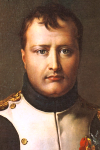
Enlarge
1st January – Murat leaves Koenigsberg. – 11 January – A Senatus consultum mobilizes 350,000 men: 100,000 men from classes 1809 to 1812; 150,000 men from class 1813 and 100,000 men from the National Guard. – 19 January – Napoleon has an interview with Pope Pius VII at Fontainebleau. – 25 January – A new Concordat is signed, still at Fontainebleau. – 26 January – Joachim Murat is received by Napoleon and accused by him of having abandoned his army.
1st February – The Count of Provence publishes a message to the French people, from his residence of Hartwell, England. – 5 February – A Senatus consultum organizes regency. – 10 February – The King of Prussia orderes a mass conscription il his entire kingdom. – 18 February – Russians enter Warsaw.
1st March – The King Frederick William III of Prussia signs a treaty of alliance with Russia. – 4 March – The Russians enter Berlin. – 11 March – The Count of Provence reminds his rights to the throne in a manifesto. – 17 March – The French evacuate Dresden. – 18 March – King Joseph leaves definitively Madrid. – 22 March – Russians enter Dresden. – 23 March – Napoleon tells the Legislature he will take command of the army. – 24 March – Pope Pius VII retracts and denounces the Concordat of Fontainebleau. – 27 March – Prussia officially declares war on France. Its ambassador demands his passports. – 29 March – Russia and Austria sign a secret pact. – 30 March – Establishment of a Regency Council: Empress Marie-Louise becomes regent and Jean-Jacques Régis de Cambacérès is appointed privy councilor. – 31 March – Russians enter Leipzig.
3rd April – A Senatus consultum mobilizes 180,000 additional troops. – 15 April – Departure of Napoleon 1 for the army. – 25 April – Arrival of the Emperor in Erfurt. He takes command of troops.
1st May – Death of Marshal Bessières, Duke of Istria. – 2nd May – Battle of Lützen. – 8 May – Napoleon 1 enters the city of Dresden, which has been abandoned by the allied sovereigns. – 10 May – The army cross the river Elbe in the presence of Napoleon. – 21 May – Battle of Bautzen. – 27 May – Allies retreat towards Breslau. In Spain, the French definitively leave Madrid. – 29 May – Marshal Davout resumes Hamburg.
4 June – An armistice for two months is signed at Pleiswitz. – 14 June – England and Prussia sign the Treaty of Reichenbach, the first gives the latter a subsidy of 666,660 pounds sterling to continue the war. – 15 June – Russia, on the other hand, receives 1,333,334 pounds to continue the war. – 29 June – The command of the Prussian army is entrusted to Gebhard Leberecht von Blücher.
10 August – Napoleon 1, anticipating the resumption of hostilities, is celebrating his birthday in advance at Dresden. The king and the princes of Saxony attend a parade which gathers forty thousand men. – 11 August – Denunciation of the armistice. Austrians and Prussians join up. – 12 August – Austria receives 500,000 pounds and declares war on France. – 14 August – Blücher initiates the hostilities. – 26 August – Battle of Dresden. – 27 August – Battle of Dresden (continued). General Jean Victor Marie Moreau, who had joined the russian ranks, is mortally wounded on the battlefield. Blücher retreats.
3rd September – Napoleon 1 pursues Blücher. – 6 September – Marshal Ney is beaten by the Prussians under Bülow at Dennewitz. – 23 September – Prussians retreat to the river Spree.
8 October – Bavaria defects and joins the coalition in the Treaty of Ried. – 9 October – Call in advance of class 1815 (160,000 men). – 16 October – Battle of Leipzig. – 17 October – Battle of Leipzig (continued). – 18 October – Battle of Leipzig (end). The Saxon army defects. – 19 October – Retreat of the French army.
2nd November – French army evacuates Frankfurt and crosses back the river Rhine. – 3rd November – The King of Württemberg joins the allies. – 7 November – Napoleon leaves Mainz. – 9 November – He arrives at Saint-Cloud. – 12 November – The allies come to Dusseldorf. – 16 November – People uprises against the French in Amsterdam. – 22 November – The Russians come to Amsterdam. – 25 November – Defection of the Grand Duke of Baden. – 30 November – The Prince of Orange lands in Holland.
2nd December – The allies cross the
river Rhine. – 9 December –
Evacuation of Breda by the French. – 10 December –
The British land in Tuscany. – 12 December –
The Treaty of Valençay between France and Ferdinand VII recognizes
him as King of Spain. – 15 December –
Armistice is signed between Russia and the King of Denmark. – 21
December – The Allied armies enter Switzerland. – 23
December – The Austrians appear in Alsace. – 26
December – Twenty-three senators and councilors of state
are sent in the military divisions; they act as special commissioners to
expedite the conscription and national guards. – 29
December – French Legislature, by 223 votes against 51,
votes a report of its committees, condemning the ambitious activity
of the Emperor, asking him to declare that he will continue the war for
independence and territorial integrity of France, and begging to keep the
laws that guarantee to French a free exercise of their political rights.
– 30 December – Occupation
of Geneva by the Austrians. – 31 December –
Napoleon I adjournes the Legislature and bans the printing of the report
voted on 29 december.